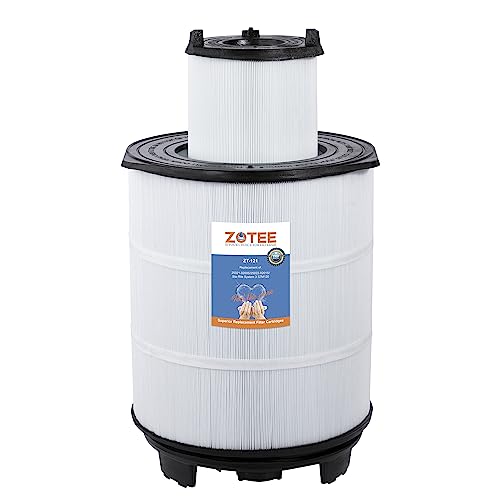Top 5 Above Ground Pool Filters for Crystal Clear Water
Are you ready to enjoy sparkling, crystal-clear water in your above ground pool? A top-notch above ground pool filter is your key to maintaining a pristine swimming environment.
In this comprehensive guide, we'll unveil the best options available, answer common questions, and provide essential insights to help you choose the perfect filter for your pool. Say goodbye to murky waters and hello to a refreshing swim as we dive into the world of above ground pool filtration.
Compare Products
- AI Score9.2
AI Score is a ranking system developed by PoolResearchs.com. PoolResearchs score has no relationship or impact from any manufacturers or sales agent websites. Learn more
- BrandIntex
- Prime
- AI Score9.2
AI Score is a ranking system developed by PoolResearchs.com. PoolResearchs score has no relationship or impact from any manufacturers or sales agent websites. Learn more
- BrandSEWANTA
- Prime
- AI Score9.0
AI Score is a ranking system developed by PoolResearchs.com. PoolResearchs score has no relationship or impact from any manufacturers or sales agent websites. Learn more
- BrandSUNSET FILTERS
- Prime
- AI Score8.8
AI Score is a ranking system developed by PoolResearchs.com. PoolResearchs score has no relationship or impact from any manufacturers or sales agent websites. Learn more
- BrandIntex
- Prime
- AI Score8.6
AI Score is a ranking system developed by PoolResearchs.com. PoolResearchs score has no relationship or impact from any manufacturers or sales agent websites. Learn more
- BrandXtremepowerUS
Last update on 2023-09-29 / Affiliate links / Images, Product Titles, and Product Highlights from Amazon Product Advertising API
Pros:
- Cleaner Water: The right filter ensures your pool water is free from debris, algae, and contaminants.
- Low Maintenance: Most filters are designed for easy upkeep, saving you time and effort.
- Improved Circulation: Proper filtration promotes better water circulation and distribution of chemicals.
- Extended Pool Life: A high-quality filter can contribute to the longevity of your pool and its equipment.
- Health and Safety: Clean water reduces health risks and makes swimming safer.
Cons:
- Upfront Cost: Quality filters can be expensive, although the long-term benefits often outweigh the initial investment.
- Energy Consumption: Some filters require significant energy to operate, impacting your utility bills.
- Occasional Repairs: Filters may need occasional maintenance or replacement parts, incurring extra costs.
1. Filter Type:
-
Sand Filters: Sand filters are low-maintenance and cost-effective. They use a special sand medium to capture debris and contaminants. These filters require occasional backwashing to remove trapped particles. Ideal for those who want minimal maintenance.
-
Cartridge Filters: Cartridge filters use a replaceable cartridge made of pleated polyester or other materials to trap debris. They offer excellent filtration and are relatively low maintenance. Cartridges should be replaced periodically.
-
DE (Diatomaceous Earth) Filters: DE filters provide the highest level of filtration by using diatomaceous earth, a fine white powder, to capture even the smallest particles. They require more maintenance, including adding DE powder and occasional backwashing.
2. Filter Size and Flow Rate:
Calculate your pool's volume (length x width x depth) to determine the required flow rate in gallons per minute (GPM). Choosing the right filter size is crucial for efficient filtration and circulation. A filter that is too small may struggle to keep your pool clean, while an oversized filter can waste energy.
3. Filtration Efficiency:
Consider the filtration efficiency of the filter media. Look for filters with multiple filtration stages or advanced technologies like microban or catalytic media to remove a wide range of particles and contaminants. High-quality filters will leave your pool water crystal clear.
4. Durability and Brand:
Invest in a filter from a reputable brand known for its durability and longevity. Consider the availability of replacement parts and the quality of customer support. A well-made filter should last for many pool seasons with proper maintenance.
5. Energy Efficiency:
Look for energy-efficient models that minimize operating costs. Variable speed pumps and energy-efficient motors can significantly reduce electricity consumption. Consider the impact of energy efficiency on your utility bills and the environment.
1. How often should I clean my above ground pool filter?
- Answer: You should clean your filter every 2-4 weeks, or when the pressure gauge indicates a 10-15 psi increase from the baseline.
2. What filter type is best for above ground pools: sand, cartridge, or DE?
- Answer: The choice depends on your preference. Sand filters are low maintenance, cartridge filters offer good filtration, and DE filters provide the finest cleaning.
3. How can I determine the right filter size for my pool?
- Answer: Calculate your pool's volume (length x width x depth) in gallons. Then, select a filter with a flow rate suitable for your pool's size, typically measured in gallons per minute (GPM).
Choosing the best above ground pool filter is essential for a crystal-clear, inviting swimming experience. With the right filter, you can enjoy cleaner water and minimal maintenance. Whether you opt for a sand, cartridge, or DE filter, regular cleaning and proper sizing are key. We hope this guide has helped you make an informed decision for your above ground pool, ensuring it remains a source of relaxation and enjoyment all season long.


![Pool Filter [Set of 4] Pool Filters Type A or C - Replacement Pool Filters for Above Ground Pools - Compatible with All Intex & Bestway Pool Filter Cartridge Pumps, Rated from 500/2,500 GPH. Pool Filter [Set of 4] Pool Filters Type A or C - Replacement Pool Filters for Above Ground Pools - Compatible with All Intex & Bestway Pool Filter Cartridge Pumps, Rated from 500/2,500 GPH.](https://m.media-amazon.com/images/I/51EqPhtTwfL._SL500_.jpg)











